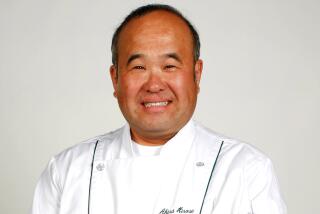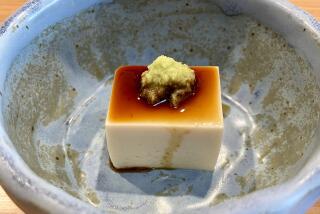Momofuku Ando, 96; inventor’s Cup Noodle became an instant hit
- Share via
TOKYO — Momofuku Ando, a Japanese businessman whose later-in-life invention of instant noodles revolutionized how we eat one of the world’s oldest foods, died Friday of heart failure in an Osaka-area hospital. He was 96.
Ando’s entrepreneurial genius was to shuck off centuries of tradition and realize that noodles did not necessarily have to be cooked fresh and served only after being steeped in vats of boiling water. After tinkering for a year in his backyard shed, he discovered that noodles could be dried, packaged and rehydrated in a bowl of boiling water in just three minutes -- and served almost anywhere.
His gamble with flour, palm oil and MSG created a new food that appealed to tastes across Asia and in the United States. He began exporting instant ramen to the U.S. in 1970 and a year later created Cup Noodle -- noodles that could be sold and prepared in the same container -- inspired by the way American consumers plopped their noodles into a cup and ate them with a fork.
The focus on convenience, taste and price turned Nissin Foods Co., his small Osaka company, into a $3-billion multinational corporation with 29 subsidiaries in 11 countries.
As recounted in his 2002 autobiography, “How I Invented Magic Noodles,” Ando’s eureka moment occurred in 1957, when he noticed a long line of customers waiting for service outside a noodle shop. He asked himself if there was not a faster way to serve all those busy-but-famished construction workers and salarymen who were working late shifts and overtime hours to rebuild Japan after the war.
A year later, he introduced what was first called “Chiken Ramen.” He tested the product in one local store in Osaka Prefecture and began mass production after Japanese customers proved they were prepared to defy the sneering of Japan’s traditional udon and soba noodle makers. They were also, initially at least, willing to pay up to six times more than they would for fresh noodles in return for the convenience of the quick serving.
Within a year, the company was selling 10,000 portions daily, and competitors began crowding a market that now sees each consumer in this country of 126 million eat an average of about 45 portions of instant noodles annually. Worldwide, the industry sold 85 billion packages in 2005.
Under Ando, who remained chairman until 2005 and was still listed as chairman-founder when he died, Nissin has maintained its market leadership in Japan with a steady stream of new products. Instant noodles now come in flavors ranging from picante shrimp to Cajun chicken. The company has branched into frozen foods, soups and desserts.
And in 2005, Japanese astronaut Soichi Noguchi chowed down in the space shuttle Discovery on a bowl of Nissin’s Space Ram, whose vacuum-sealed packet was developed with Japan’s space agency.
Ando’s personal success story mirrored Japan’s fall and rise from the ashes. He was 48 when he invented the noodles that would make his fame and fortune, after having incurred a long list of business setbacks.
Ando was born to Taiwanese parents in Taiwan, then a Japanese colony, in 1910. Both his parents died when he was still an infant. He was raised by his grandparents and as a boy worked in the couple’s fabric store.
The experience stirred a spirit for business, he recalled in his autobiography, and after moving to Japan in 1933, he tried his hand at a variety of enterprises through the years of Japan’s Pacific wars, selling salt, magic-lantern projectors and prefabricated houses and running a school.
But in 1948 he was arrested and convicted on charges of tax evasion. In his biography, Ando says he had provided scholarships for students, which at the time was a form of tax evasion, and he spent two years in jail. After his release, a credit union on whose board of directors he served went bankrupt, and Ando lost all assets but his house.
His invention arrived at the precipitous moment that Japan, too, was getting back on its feet. The country was beginning to modernize in the late 1950s, with supermarkets opening and Japanese consumers developing demand for products that smacked of the nascent high-tech age. It also coincided with the arrival of television as a major presence. Most observers credit the company’s creatively adventurous TV ads with much of its success in holding market share.
Some of the most memorable ads in Japan ran in the late 1980s and early 1990s and starred Arnold Schwarzenegger. The ads promoting Cup Noodle were notably less goofy than most of the commercials that feature Western stars. One, showing the muscular action hero swinging two heavy kettles over his head, received creative plaudits and is still widely remembered in Japan.
Nissin replaced Schwarzenegger with a long-running series of prize-winning ads featuring cavemen struggling to put food on the table in a hostile environment, with instant noodles being produced to save the day.
Ando is survived by his wife, Masako; two sons; and a daughter. His son Koki Ando is president of Nissin Food Products Co. Ltd.
*
More to Read
Eat your way across L.A.
Get our weekly Tasting Notes newsletter for reviews, news and more.
You may occasionally receive promotional content from the Los Angeles Times.










